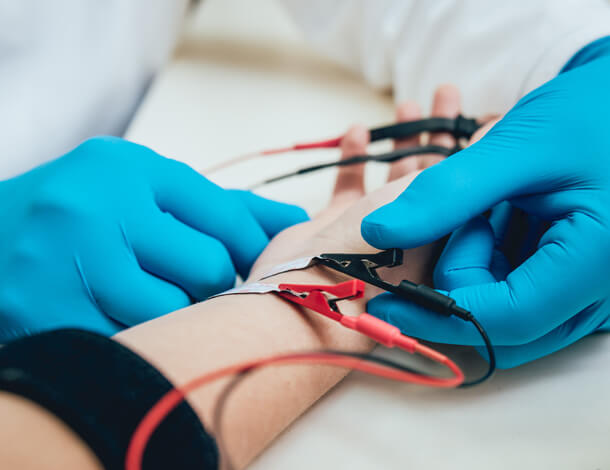When Is It Time to Consider EMG Testing for Carpal Tunnel?

In the technology age, if someone’s hand persistently hurts, their first thought is carpal tunnel syndrome (CTS). But it’s not the only cause of finger tingling and numbness. Though not always necessary to make a diagnosis, EMG testing for carpal tunnel can confirm the suspicion and start a conversation about pain relief treatment options.
About 10 million Americans suffer from carpal tunnel syndrome. You might be one of them, but carpal tunnel syndrome isn’t a generic term for any nerve issue in your fingers and wrist. Instead of Googling and guessing, consider an EMG test for an accurate diagnosis. If you have carpal tunnel, there are options to reduce pain and regain the use of your hands.
Read on to see if you’re a good candidate for the testing procedure and what to expect if you schedule an EMG/NCS testing appointment.
Understanding Carpal Tunnel Syndrome
Carpal tunnel syndrome results from extra pressure on the median nerve that passes through a bony channel in the wrist, reducing blood flow to the nerve. Finger tendons run through the same tunnel. It’s crowded in there, and when there is too much pressure on the nerve, blood flow can be disrupted, resulting in the symptoms associated with carpal tunnel.
If you find yourself balling up and flexing your hands as if they were asleep, progressing to dropping objects and avoiding tasks that involve dexterity, you might have carpal tunnel syndrome.
Common Signs of CTS
Symptoms of carpal tunnel syndrome can include:
- Hand tingling that’s often worse at night (e.g., waking up at night from hand numbness and having to shake it to regain feeling)
- Fingers that feel swollen or fuzzy
- Dropping objects
- Feeling weakness when trying to pinch
- Discomfort in your wrist, hand, or fingers
Carpal Tunnel Syndrome Causes
CTS is commonly associated with heavy computer use. However, it’s a misconception that using a keyboard or mouse causes carpal tunnel. Though most cases are idiopathic or without a known underlying cause, the primary conditions which are associated with carpal tunnel syndrome are:
- Wrist fractures and dislocations
- Chronic inflammation and nerve-damaging diseases
- Inflammation or swelling about the tendons
- Fluid retention
- Tumors and tumor-like conditions
- Pregnancy (due to fluid retention)
- Heavy use of vibrating tools
- High repetition of finger use
You may be at a higher risk for developing carpal tunnel syndrome if you have:
- Rheumatoid/degenerative arthritis
- Thyroid disease
- Diabetes
- Obesity
- The cancer drug anastrozole (Arimidex)
- A smaller carpal tunnel
Find out more about other conditions that can hand numbness
Role of EMG Studies in Diagnosing Carpal Tunnel
CTS is a common condition, but reliable, successful treatment can begin when you have an EMG test to diagnose carpal tunnel.
Specialists use electromyography (EMG) to assess nerve and muscle health. The test reads the body’s electrical signals that produce movement and carry signals associated with feeling. An EMG test for carpal tunnel evaluates the health of the median nerve.
An EMG can diagnose carpal tunnel syndrome and help detect the location and severity of the nerve damage. This type of testing can also assist in ruling out other conditions that can mimic it.
A carpal tunnel syndrome diagnosis lets you receive the best treatment, and it can point to an underlying chronic condition, like rheumatoid arthritis or diabetes.
What to Expect During Testing
You’ll lie down while an electrophysiology specialist completes the EMG/NCS testing. This will typically last 20 to 40 minutes.
A nerve conduction study happens first. This part of the testing is completed to learn more about your nerve health. Your electrophysiology specialist will attach sensors to your skin near the thumb, then gently press a pronged device against your arm that delivers tiny electrical pulses for nerve stimulation.
The second part of the testing is the EMG. Your electrophysiology specialist will insert a small, thin EMG needle into your arm muscle for this procedure. The needle will use its built-in sensors to test your muscle response while it delivers microstimulations.
IHTSC performs thousands of EMGs each year. Our nerve testing specialist focuses his practice solely on EMG testing, allowing patients to feel more confident in their provider.
FAQs About EMG Testing for Carpal Tunnel
What Is an EMG Test for Carpal Tunnel Syndrome Used For? When Is It Recommended?
The test confirms a physician’s clinical diagnosis based on your medical history and symptoms. It may be recommended when your symptoms are bothersome enough to seek treatment. An EMG may be ordered to confirm CTS if you are considering surgery.
Do You Need an EMG to Diagnose Carpal Tunnel?
A physician can diagnose based on your history and physical examination. However, obtaining an EMG/NCS may help distinguish between carpal tunnel and other neuropathic conditions or evaluate the severity of the condition.
Can a Nerve Conduction Study (NCS) Diagnose Carpal Tunnel Syndrome?
This is one part of a typical carpal tunnel diagnostic exam. It tests nerve health but not muscle health. It’s more effective when paired with an EMG.
What Can Throw Off an EMG Test for Carpal Tunnel?
Body lotions, creams, and oils must be washed off before testing as they can cause the electrodes to not adhere properly to the skin. Spinal cord stimulators and deep brain stimulators can cause artifacts that can disrupt EMG signals so it is beneficial if patients can turn off these devices before testing.
Can an EMG Test Rule Out Carpal Tunnel? What Are Normal EMG Results for CTS?
While no test can completely rule out a diagnosis, EMG/NCS testing is the gold standard for diagnosing carpal tunnel syndrome and has a 95–98% accuracy rate. Testing also provides a severity of carpal tunnel syndrome, which helps guide appropriate treatment.
At IHTSC, Dr. Dylan M. Abshire, ECS—an experienced, board-certified electrophysiology specialist—performs our electromyography and nerve conduction studies.
Do You Get Immediate Results After Having EMG Testing for Carpal Tunnel?
Results are usually available within a couple of days. The physician who ordered the test will review the results with you in a follow-up appointment.
Do I Have to Stop Taking Medication Before the Test?
Rarely. Tell your provider about your medications when you schedule the test.
Does an EMG Test for Carpal Tunnel Hurt?
No. The minor to moderate discomfort from the needle and electrical pulses passes quickly. Carpal tunnel hurts significantly more.
Do You Have to Have Anesthesia to Get an EMG Test for Carpal Tunnel?
No. And you will be able to drive after the test.
Learn More About IHTSC’s Electromyography & Nerve Conduction Studies
CTS Treatment and Management Post-Diagnosis
Following a positive test result, your physician will determine a treatment plan depending on the severity of your carpal tunnel.
Remedies for light and moderate cases include:
- Wearing a splint at night
- Reducing aggravating activity
- Cortisone injection
Severe cases of extensive weakness or muscle deterioration could require minimally invasive or open surgery on the wrist ligament with a recovery time of up to eight months.
Carpal Tunnel Syndrome Prevention and Long-Term Care
If you stay disciplined with maintenance and prevention techniques, you can keep the symptoms of carpal tunnel syndrome from affecting your daily life. Make a habit of these behaviors:
- Follow all advice from your specialist.
- Avoid long stretches of repetitive motions that put pressure on your wrist.
- If you work with tools, try a lighter grip (as long as it’s safe) and take frequent breaks. Consider gloves that help dampen vibration.
- Keep your wrist straight as much as possible.
- Alternate hands when performing repetitive motions if you can.
- Wear a wrist brace.
Book a Testing Appointment at IHTSC
Carpal tunnel syndrome doesn’t have to be severe before you seek treatment. If you’re experiencing hand pain and numbness, it may worsen without diagnosis and treatment.
An EMG test is the quickest and most effective way to diagnose the source of your discomfort, develop a targeted treatment plan, and regain your strength and dexterity.
One of our patients, Laura, changed her life after she came to IHTSC in pain, frustration, and sleeplessness caused by carpal tunnel. She had gradually stopped doing regular daily activities, like putting on makeup or opening jars. After injections failed to relieve the symptoms, she chose to have an EMG and then surgery. She says IHTSC gave her back her life. After recovering, she and her husband began renovating their historic home.
“I have no idea why I waited so long to find a solution for the loss of use and pain in my hands. But I couldn’t be any happier with the care I received and its results,” she said.
At IHTSC, our doctors specialize in diagnosing and treating numbness and discomfort caused by conditions like carpal tunnel syndrome. If you are experiencing tingling, numbness, and discomfort in your fingers, call us directly at (317) 875-9105 to book an appointment or schedule online.
You Might Also Like:
Disclaimer: The materials on this website have been prepared for informational purposes only and do not constitute advice. You should not act or rely upon any medical information on this website without a physician’s advice. The information contained within this website is not intended to serve as a substitution for a thorough examination from a qualified healthcare provider. The display of this information is not intended to create a health care provider-patient relationship between the Indiana Hand to Shoulder Center and you.



